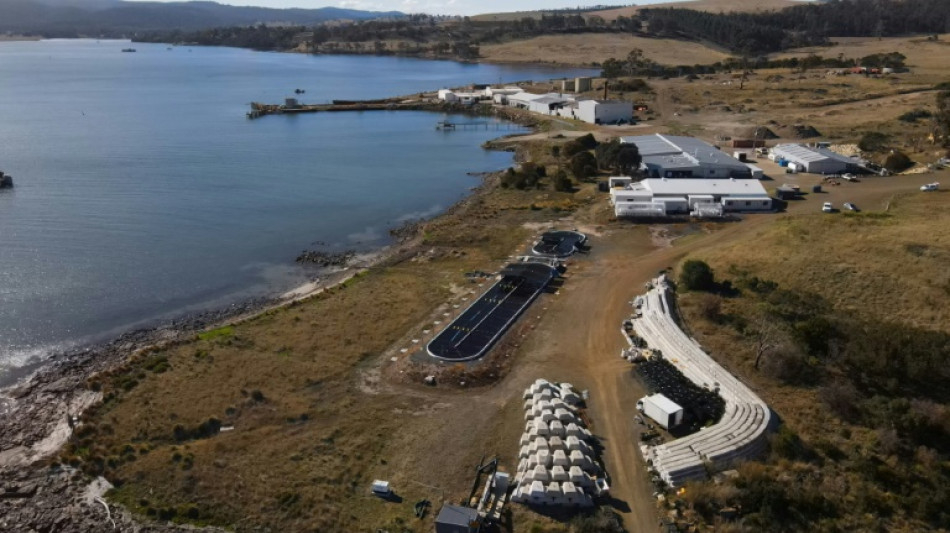
-
 'Not our enemy': Rush to rearm sparks backlash in east Germany
'Not our enemy': Rush to rearm sparks backlash in east Germany
-
West Indies 110-0, trail by 465, after Conway's epic 227 for New Zealand

-
 Arsonists target Bangladesh newspapers after student leader's death
Arsonists target Bangladesh newspapers after student leader's death
-
Volatile Oracle shares a proxy for Wall Street's AI jitters

-
 Tears at tribute to firefighter killed in Hong Kong blaze
Tears at tribute to firefighter killed in Hong Kong blaze
-
Seahawks edge Rams in overtime thriller to seize NFC lead

-
 Teenager Flagg leads Mavericks to upset of Pistons
Teenager Flagg leads Mavericks to upset of Pistons
-
Australia's Head fires quickfire 68 as England's Ashes hopes fade

-
 Conway falls for 227 as New Zealand declare at 575-8 in West Indies Test
Conway falls for 227 as New Zealand declare at 575-8 in West Indies Test
-
Japan hikes interest rates to 30-year-high

-
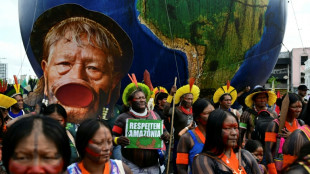 Brazil's top court strikes down law blocking Indigenous land claims
Brazil's top court strikes down law blocking Indigenous land claims
-
Conway falls for 227 as New Zealand pass 500 in West Indies Test

-
 'We are ghosts': Britain's migrant night workers
'We are ghosts': Britain's migrant night workers
-
Asian markets rise as US inflation eases, Micron soothes tech fears
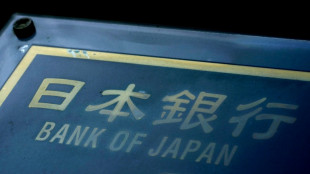
-
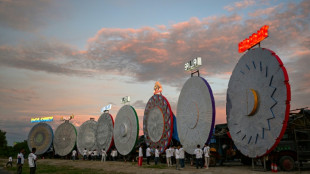 Giant lanterns light up Christmas in Catholic Philippines
Giant lanterns light up Christmas in Catholic Philippines
-
TikTok: key things to know

-
 Putin, emboldened by Ukraine gains, to hold annual presser
Putin, emboldened by Ukraine gains, to hold annual presser
-
Deportation fears spur US migrants to entrust guardianship of their children

-
 Upstart gangsters shake Japan's yakuza
Upstart gangsters shake Japan's yakuza
-
Trump signs $900 bn defense policy bill into law

-
 Stokes's 83 gives England hope as Australia lead by 102 in 3rd Test
Stokes's 83 gives England hope as Australia lead by 102 in 3rd Test
-
Go long: the rise and rise of the NFL field goal

-
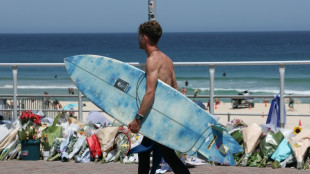 Australia announces gun buyback, day of 'reflection' after Bondi shooting
Australia announces gun buyback, day of 'reflection' after Bondi shooting
-
New Zealand Cricket chief quits after split over new T20 league

-
 England all out for 286, trail Australia by 85 in 3rd Test
England all out for 286, trail Australia by 85 in 3rd Test
-
Australian announces gun buyback, day of 'reflection' after Bondi shooting
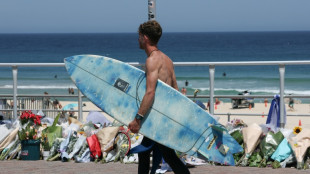
-
 Joshua takes huge weight advantage into Paul fight
Joshua takes huge weight advantage into Paul fight
-
TikTok signs joint venture deal to end US ban threat

-
 Conway's glorious 200 powers New Zealand to 424-3 against West Indies
Conway's glorious 200 powers New Zealand to 424-3 against West Indies
-
WNBA lockout looms closer after player vote authorizes strike

-
 Honduras begins partial vote recount in Trump-dominated election
Honduras begins partial vote recount in Trump-dominated election
-
Nike shares slump as China struggles continue

-
 Hundreds swim, float at Bondi Beach to honour shooting victims
Hundreds swim, float at Bondi Beach to honour shooting victims
-
Crunch time for EU leaders on tapping Russian assets for Ukraine

-
 Pope replaces New York's pro-Trump Cardinal with pro-migrant Chicagoan
Pope replaces New York's pro-Trump Cardinal with pro-migrant Chicagoan
-
Trump orders marijuana reclassified as less dangerous drug

-
 Rams ace Nacua apologizes over 'antisemitic' gesture furor
Rams ace Nacua apologizes over 'antisemitic' gesture furor
-
McIlroy wins BBC sports personality award for 2025 heroics

-
 Napoli beat Milan in Italian Super Cup semi-final
Napoli beat Milan in Italian Super Cup semi-final
-
Violence erupts in Bangladesh after wounded youth leader dies

-
 EU-Mercosur deal delayed as farmers stage Brussels show of force
EU-Mercosur deal delayed as farmers stage Brussels show of force
-
US hosting new Gaza talks to push next phase of deal

-
 Chicago Bears mulling Indiana home over public funding standoff
Chicago Bears mulling Indiana home over public funding standoff
-
Trump renames Kennedy arts center after himself

-
 Trump rebrands housing supplement as $1,776 bonuses for US troops
Trump rebrands housing supplement as $1,776 bonuses for US troops
-
Harrison Ford to get lifetime acting award

-
 Trump health chief seeks to bar trans youth from gender-affirming care
Trump health chief seeks to bar trans youth from gender-affirming care
-
Argentine unions in the street over Milei labor reforms

-
 Trump signs order reclassifying marijuana as less dangerous
Trump signs order reclassifying marijuana as less dangerous
-
Famed Kennedy arts center to be renamed 'Trump-Kennedy Center'


Australian seaweed farm tackles burps to help climate
It is barely visible, and needs no irrigation or fertilisers: lying off the coast of Australia is a vast seaweed crop destined to curb livestock's climate-altering flatulence and belches.
The underwater farm stretches across 1,800 hectares (4,400 acres) in the Tasman Sea, about 10 minutes off the portside town of Triabunna in the island state of Tasmania.
Beneath the waves are forests of asparagopsis, a native red seaweed abundant in Tasmanian coastal waters which is rich in the organic compound bromoform.
More than 40 studies have shown that the seaweed can lower methane emissions from livestock when added to fodder or grain, said Fran Cowley, researcher at Australia's University of New England.
According to the UN's Food and Agriculture Organization, emissions from ruminants and manure management practices account for more than 32 percent of the world's methane emissions related to human activity.
"When we look at gold-standard measurement of methane inhibition, asparagopsis is able to achieve almost complete suppression of methane suppression -- so, 95 percent," said Cowley, professor of livestock production and a leading researcher into ruminants.
While far less abundant in the atmosphere than carbon dioxide, methane is about 80 times more potent over a 20-year timescale at warming the planet.
But its lifespan is shorter, making it an important lever in attempts to limit global warming.
- Juicy meat -
Cowley led one of the longest experiments into asparagopsis, held over 200 days in bovine feed lots in the eastern state of Queensland.
Results published in August 2024 showed emissions from the animals were halved over that period when compared to animals that received no supplements.
The outcome indicated an improvement from a previous study, one of the most advanced in the field at the time, in which emissions from a Japanese herd were reduced by 28 percent.
The bromoform within the seaweed affects the digestive system and curbs the animals' burps and farts without impacting their health or the quality of the resulting food products, Cowley said.
Bromoform is a concern because at high levels it has been considered to be carcinogenic in rats, and potentially humans, she said.
But researchers found it was degraded in the stomachs of grazing animals.
"So there is no accumulation of bromoform in the meat or in the milk because it's only coming in at a relatively low dose to start with," Cowley told AFP.
"All the studies that have been done on meat have shown absolutely no accumulation of bromoform, or any impact on the taste, or the tenderness, or the juiciness of meat."
Studies had shown that any damage to the animals' rumen -- a chamber in the stomach that breaks down plants -- was no worse than in those fed a grain-based feedlot diet, she said.
- 'Enabling force' -
In Triabunna, Sea Forest's marine farm produces feed supplements from the seaweed: oils, pellets and "lick blocks" -- a solid form that animals can lick to consume.
Sea Forest founder and chief executive Sam Elsom turned to seaweed farming in 2019, after about 15 years in the textile industry.
The company wants to be the "enabling force" to make agricultural products sustainable without extra costs to farmers and consumers, he told AFP.
The seaweed is grown partly in the open sea and partly in filtered seawater ponds on land, which are easier to replicate elsewhere in the world and allow growers to control light, nutrients, and the availability of carbon.
Sea Forest is already working with Tasmanian dairy company Ashgrove and Australian burger chain Grill'd, and had signed an agreement last year with British supermarket chain Morrisons, Elsom said.
It also held "encouraging" talks with some French dairy producers and was in the process of registering its seaweed products with the European Food Safety Authority, he said.
One of the big challenges was cost to farmers, who need financial incentives and support to make the effort to lower livestock methane emissions worthwhile, Elsom said.
The ocean provides an "amazing natural resource" for food security, he said.
"Seventy-one percent of the Earth's surface is surrounded by the ocean, and seaweed require zero inputs: No irrigation, no fertiliser, no pesticides.
"So, it can grow up to 30 times faster than land-based plants. It's very exciting."
C.Meier--BTB
